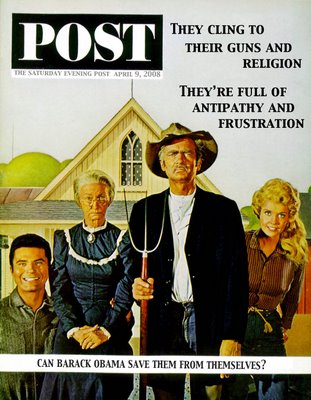Both the blogs and the MSM have been featuring Obama’s estimation of why just plain folks seem to not be warming to him in Pennsylvania:

“So it’s not surprising then that they get bitter, they cling to guns or religion or antipathy to people who aren’t like them or anti-immigrant sentiment or anti-trade sentiment as a way to explain their frustrations.”
[Image HT to Gino, via The Lumberjack, who really knows how to get his whacks in.]
While the blogs tend to feature the entire quote, the MSM (or the apologists offering commentary in the MSM) tend to focus on the “bitterness” part of the statement while ignoring the rest of Obama’s ignorant statement. I say “ignorant” here not in terms of “stupid” but according to the “lacking knowledge or comprehension of the thing specified” meaning of the word. Essentially, Obama’s statement is an ill-informed assumption on his part, based on his experience or world-view. I say it’s ignorant because I was reminded of a Pew Research Center study that I blogged about back in 2005 after reading about it on Craig Westover’s blog. My post read, in part:
The study suggests that the old political party stereotypes of rich and poor, educated and less-educated no longer hold up as the two major parties now have similar demographics in terms of the distribution in these categories. The primary difference is now along the lines of attitude. From the Washington Post article:
The most striking differences between lower-income Republicans and lower-income Democrats come in their perceptions of the power of the individual. Both Pro-Government Conservatives and Disadvantaged Democrats include a substantial number of people who consider themselves to be struggling financially. Overwhelming majorities in both groups say they often cannot make ends meet.
But where they part company is in their overall sense of optimism, with the Republican group expressing much greater faith in personal empowerment. Three-fourths of the Pro-Government Conservatives agreed that people can get ahead by working hard, and four-fifths agreed that everyone has the power to succeed. Just 14 percent of Disadvantaged Democrats agreed with the first statement, and only 44 percent agreed with the second.
Meanwhile, this faith in one’s ability to overcome may be rooted in a greater faith:
For all their similarities on income and education, Enterprisers on the right and Liberals on the left diverge on religious habits and cultural attitudes. For example, almost half of Enterprisers attend religious services at least weekly, while just a fifth of Liberals go to religious services that often. A fifth of Liberals are classified in the Pew study as secular – defined as atheists, agnostics or those who say they have no religious affiliation – compared with about one in 20 of the Enterprisers.
So, the way I put this together is that even though they are about the same in terms of income and education, the group with the more positive view of the future is the one that puts its faith in God and in themselves. The group with the most pessimistic outlook puts its faith in the government.
Which group do you figure already knows who its Savior is, and which one is most likely to turn, in their bitterness and hopelessness, to the next one that happens to come along?
Nevertheless, Obama has proven himself to be nothing if not resilient and adaptable. I expect that once he leaves the high-falutin’ San Francisco fund-raising circuit and returns to campaign in Pennsylvania his next quote will be, “Git ‘er done!”

 moi ?' to Del.icio.us" alt="Add 'Elitist, moi ?' to Del.icio.us" />
moi ?' to Del.icio.us" alt="Add 'Elitist, moi ?' to Del.icio.us" /> moi ?' to digg" alt="Add 'Elitist, moi ?' to digg" />
moi ?' to digg" alt="Add 'Elitist, moi ?' to digg" /> moi ?' to reddit" alt="Add 'Elitist, moi ?' to reddit" />
moi ?' to reddit" alt="Add 'Elitist, moi ?' to reddit" /> moi ?' to Stumble Upon" alt="Add 'Elitist, moi ?' to Stumble Upon" />
moi ?' to Stumble Upon" alt="Add 'Elitist, moi ?' to Stumble Upon" /> moi ?' to Google Bookmarks" alt="Add 'Elitist, moi ?' to Google Bookmarks" />
moi ?' to Google Bookmarks" alt="Add 'Elitist, moi ?' to Google Bookmarks" /> moi ?' to Ask" alt="Add 'Elitist, moi ?' to Ask" />
moi ?' to Ask" alt="Add 'Elitist, moi ?' to Ask" /> moi ?' to FaceBook" alt="Add 'Elitist, moi ?' to FaceBook" />
moi ?' to FaceBook" alt="Add 'Elitist, moi ?' to FaceBook" /> moi ?' to Barrapunto" alt="Add 'Elitist, moi ?' to Barrapunto" />
moi ?' to Barrapunto" alt="Add 'Elitist, moi ?' to Barrapunto" /> moi ?' to MySpace" alt="Add 'Elitist, moi ?' to MySpace" />
moi ?' to MySpace" alt="Add 'Elitist, moi ?' to MySpace" /> moi ?' to Twitter" alt="Add 'Elitist, moi ?' to Twitter" />
moi ?' to Twitter" alt="Add 'Elitist, moi ?' to Twitter" /> moi ?' to Social Bookmarking Reloaded" alt="Add 'Elitist, moi ?' to Social Bookmarking Reloaded" />
moi ?' to Social Bookmarking Reloaded" alt="Add 'Elitist, moi ?' to Social Bookmarking Reloaded" />